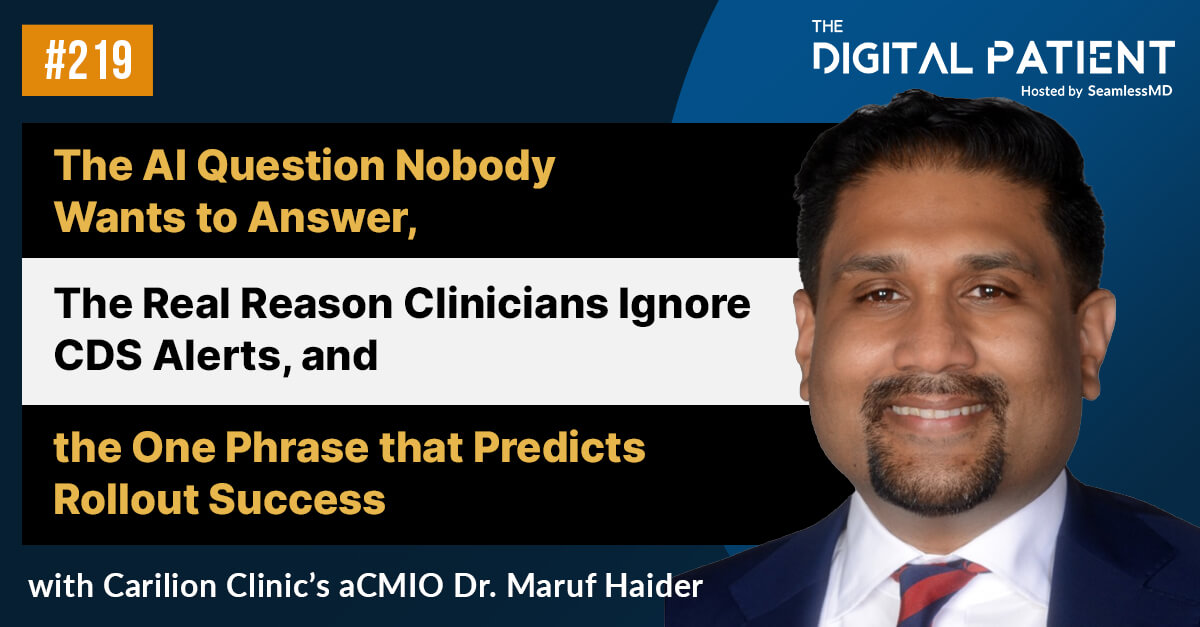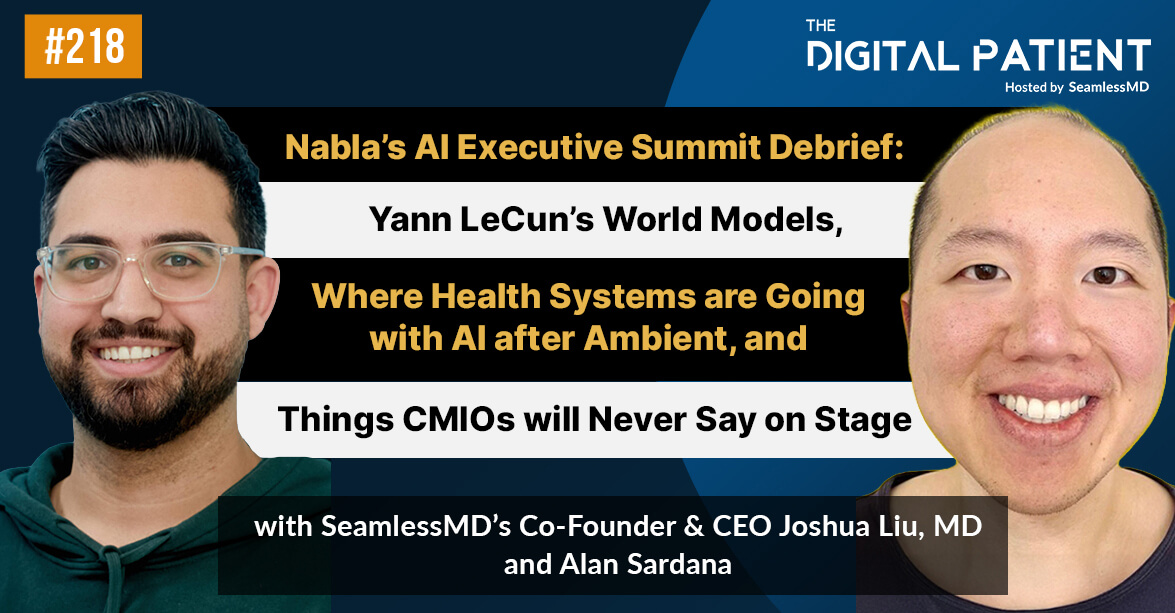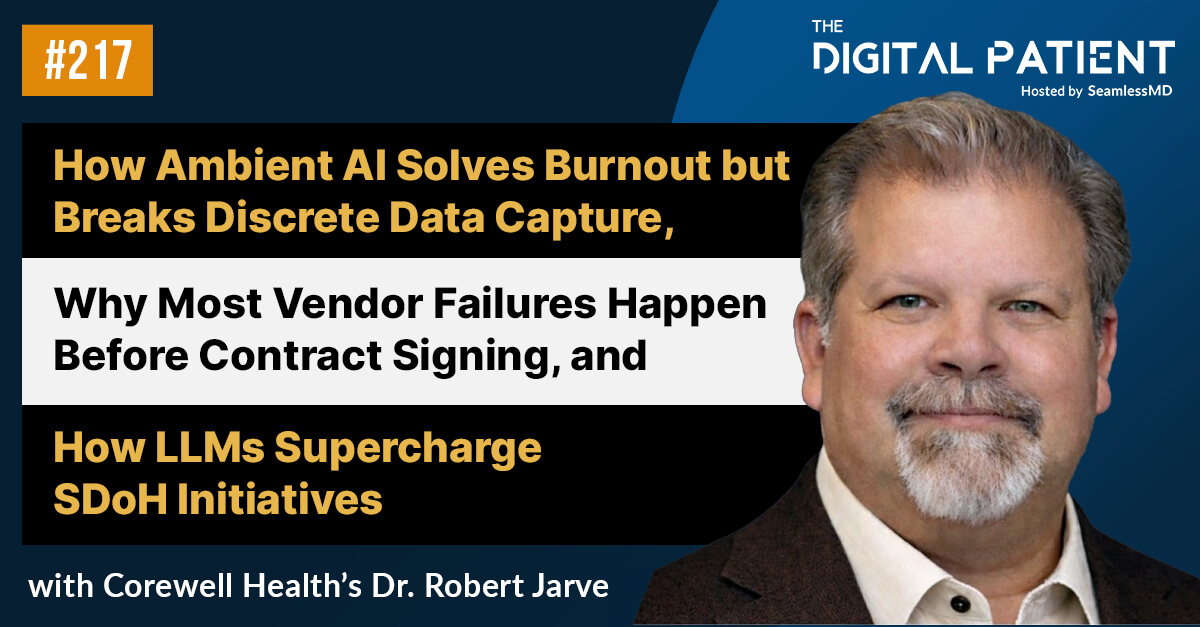Subscribe on: RSS | SPOTIFY | APPLE PODCAST | GOOGLE | BREAKER | ANCHOR
On this episode of "The Digital Patient" podcast, hosts Alan Sardana & Dr. Joshua Liu speak with Dr. David H. Berger, Chief Executive Officer at University Hospital of Brooklyn at State University of New York Downstate Health Sciences University, about the "Impact of Social Determinants of Health on Digital Health Adoption, Elevating Employee Satisfaction to Improve Patient Experience & Transitioning from Clinician to Hospital Executive." Click the play button to listen or read the show notes below.
Audio:
Video:
Guest(s):
- Dr. David Berger, Chief Executive Officer at University Hospital of Brooklyn at State University of New York Downstate Health Sciences University
- Dr. Joshua Liu (@joshuapliu), Co-founder & CEO at SeamlessMD
Episode 70 - Show Notes:
[0:00] Introducing Dr. David H. Berger, Chief Executive Officer at University Hospital of Brooklyn at State University of New York Downstate Health Sciences University;
[3:50] Why Dr. Berger piloted Digital Patient Engagement back in 2013 to improve patient access to health care across a wide geography;
[6:16] How Dr. Berger recognized the potential for digital health by watching forward-thinking health systems such as the VA;
[10:25] Why Dr. Berger advocates for having a formal implementation plan and identified clinical champion leading an implementation such as for a virtual care product so that the organization is motivated to move forward with a product that is clear and its benefit understood by frontline users;
[16:15] Why Dr. Berger launched a Digital Health 101 lecture series to provide education for the next generation of clinicians who are responsible for carrying the torch re: alleviating disparities in healthcare so they can understand how social determinants of health prevent the system from achieving its goals;
[19:19] Why Dr. Berger is excited about technology’s ability to help automate processes that can ultimately improve efficiency, improve the patient experience and deliver better care;
[21:10] Why Dr. Berger started the Digital Health Interest Group at Downstate to identify like-minded individuals within the organization who share an interest in using digital tools to improve patient access to health and hospital operations;
[23:00] Why Dr. Berger believes digital transformation over the long term will reduce disparities but is concerned about the short term as the majority of organizations currently involved with digital transformation are well-resourced and may not deal with the social issues that prevent patient access to “safety net” community health systems;
[27:29] How Dr. Berger had to learn many lessons during his transition from being a surgeon to leadership–in particular, to listen as opposed to strictly speak/lead–and why he believes self-awareness is a key trait to have for one to understand if administration would make them happy;
[35:20] How Dr. Berger trained at SUNY Downstate years ago and why joining as its CEO during COVID provided him an opportunity to shape a positive future built around a strong employee culture;
[37:43] Why Dr. Berger is focused on elevating the employee experience as it directly impacts the patient experience;
[40:15] Why Dr. Berger is excited about leveraging the EHR to better serve patients and providers using new technologies such as Artificial Intelligence (A.I.), Natural Language Processing (NLP) and Voice Recognition to improve provider efficiency and reduce the burden currently on clinician administrative work;
Fast 5 / Lightning Round:
- What is your favorite book or book you’ve gifted the most?
“Team of Rivals: The Political Genius of Abraham Lincoln” by Doris Kearns Goodwin
- How has an apparent failure set you up for greater success?
Being fired from Baylor St. Luke’s as their Chief Operating Officer and how it forced Dr. Berger to reassess his life and determine his next move.
- Would you rather have Super strength, super speed, or the ability to read people’s minds?
“Reading minds. It would be really great to decrease conflict.”
- What is something in healthcare you believe that others might find insane?
“How we are paid to do what we do. We are not incentivized to actually provide better care.”
- What is 1 hobby or activity you’ve gotten into since the pandemic?
“Getting outdoors. Hiking, skiing, etc. We also watched a lot of Ted Lasso… which has some great leadership lessons!”
.svg)










.png)
